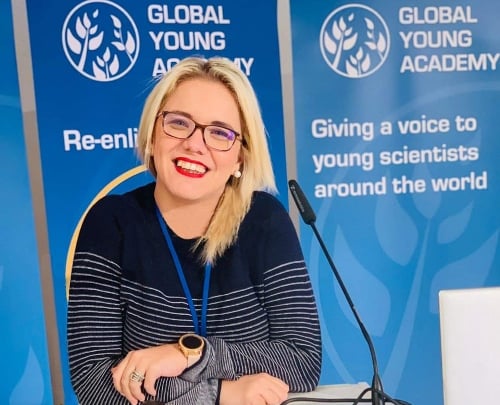Prof Roula Inglesi-Lotz, Associate Professor in the Department of Economics, attended the Annual General Meeting (AGM) of the Global Young Academy (GYA) in Halle, Germany, from 28 April to 3 May 2019.
She has been a member of the GYA since 2018 and during the AGM was elected as a co-leader of the Women in Science Working Group that provides a voice for women scientists, to be heard widely by policy and decision makers. She states: “The group aims to create awareness of the potential for change from optimal inclusion of female intellectualism in knowledge production and society in general.”
The GYA provides a rallying point for outstanding young scientists from around the world to come together to address topics of global importance. As of 2014, the GYA has reached its full capacity with 200
members: leading young scientists, typically three to ten years after their PhD, between 30 to 40 years of age, and in the early stages of their independent academic careers. Members are selected for their scientific excellence and their commitment to service and serve five-year terms. As of 2018, the GYA counts 216
alumni in addition to its 200 members, together representing 83 countries.
The GYA Anniversary Conference and AGM celebrated the 10th anniversary of the GYA and was themed ‘Re-enlightenment? Truth, reason and science in a global world’. During the AGM, Prof Inglesi-Lotz participated in a workshop on
science leadership and discussions on the role of re-enlightenment in our world, as well as meeting with
representatives of National Young Academies (NYA) from all over the world.
This follows her selection as a fellow of the
2019 Africa Science Leadership Programme (ASLP), held at
Future Africa in March, which was a joint initiative between the University of Pretoria and the Global Young Academy, with support from the
Robert Bosch Stiftung. The ASLP brought together 20 researchers from African countries to advance them in the areas of thought leadership, team management and research development. The intention was to enable them to contribute to the development of a new paradigm for science in Africa, focused on its contribution to solving the complex issues facing both Africa and the global community.


Get Social With Us
Download the UP Mobile App